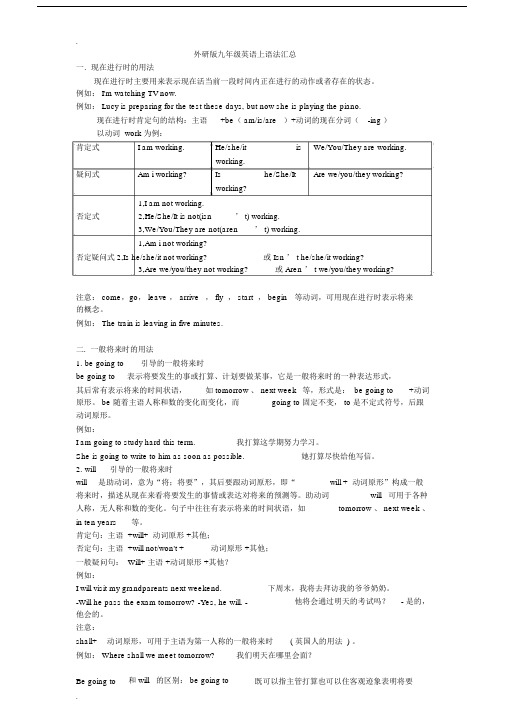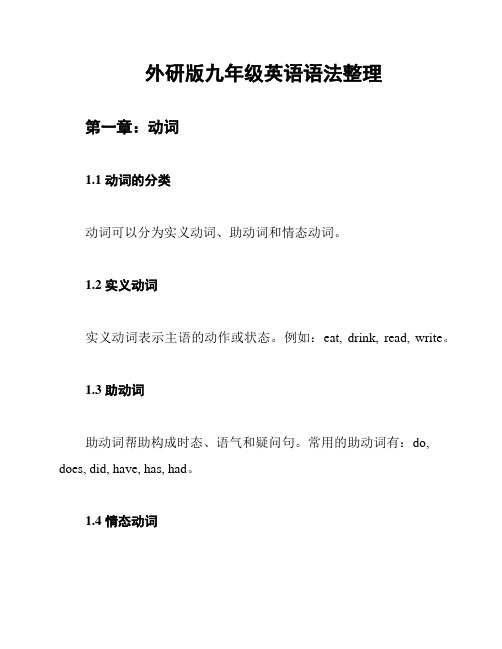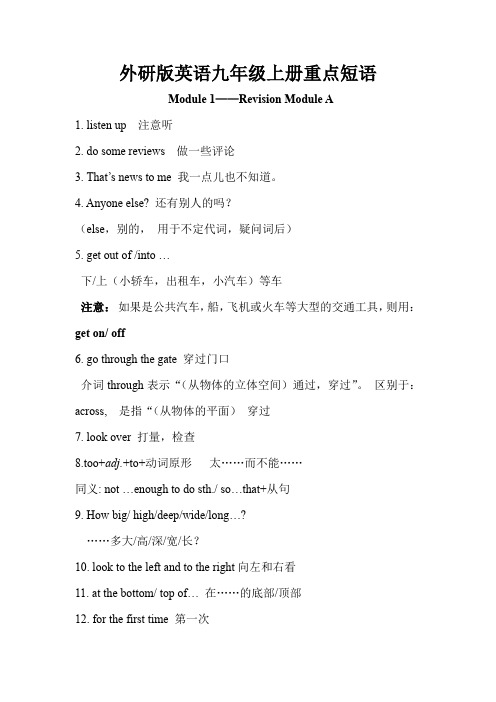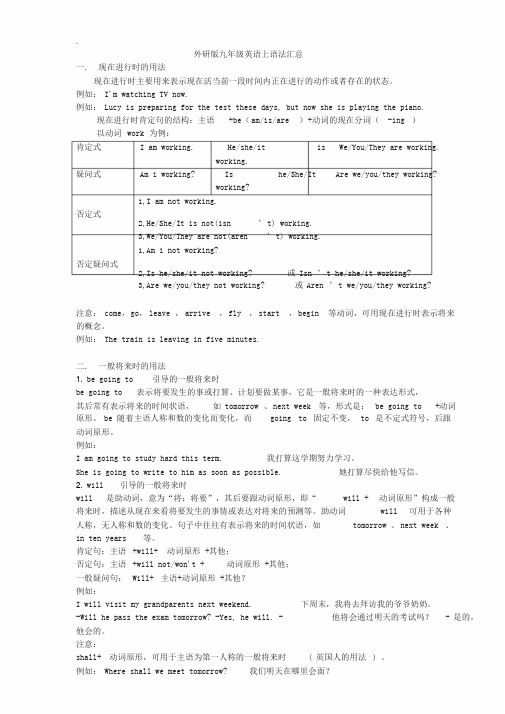外研版九年级英语上册语法知识点汇总.doc
(完整word版)外研版九年级英语上册语法知识点汇总.docx

.外研版九年级英语上语法汇总一.现在进行时的用法现在进行时主要用来表示现在活当前一段时间内正在进行的动作或者存在的状态。
例如: I'm watching TV now.例如: Lucy is preparing for the test these days, but now she is playing the piano.现在进行时肯定句的结构:主语+be( am/is/are)+动词的现在分词(-ing )以动词 work 为例:肯定式I am working.He/she/it is We/You/They are working.working.疑问式Am i working?Is he/She/It Are we/you/they working?working?1,I am not working.否定式2,He/She/It is not(isn’ t) working.3,We/You/They are not(aren’ t) working.1,Am i not working?否定疑问式2,Is he/she/it not working?或 Isn ’ t he/she/it working?3,Are we/you/they not working?或 Aren ’ t we/you/they working?注意: come,go, leave , arrive, fly, start , begin等动词,可用现在进行时表示将来的概念。
例如: The train is leaving in five minutes.二. 一般将来时的用法1. be going to引导的一般将来时be going to表示将要发生的事或打算、计划要做某事,它是一般将来时的一种表达形式,其后常有表示将来的时间状语,如 tomorrow 、 next week等,形式是: be going to+动词原形。
英语外研版九年级上册语法

外研版初中英语九年级上册内容梳理一、目录二、知识梳理与中考考点总结模块1——Nature and travel 1、需掌握单词,31例题:英译中2、语法知识——六种时态1)一般现在时——并非表示现在一般现在时并非只表示“现在”。
确切地说:表示从过去到现在直至将来的一段时间内发生的动作或存在的状态。
也就是说,这些动作或状态的发生不限于某个特定的时间,它们可以发生在任何时间,包括现在、过去和将来,这一段时间可以近乎无限长(如表示客观真理),也可以是人们生活中的一段时间(如人们的习惯活动)。
一般现在时很重要,但中考出现频率低,一般做写作要求。
1、一般现在时的构成1.1Be(am/is/are)动词的一般现在时构成:主语+be动词+……/ Be动词+主语+…肯定句/否定句:He is a rapper. We are teammates. Actually, I’m an actor. I’m not the god of medicine. I’m not wrong.一般疑问句:Are you serious?/Yes, I am./No, I am not Are you ok? Is there a problem? Is this a test?1.2实义动词的一般现在时的构成:主语+(don’t/doesn’t)+动词原形/第三人称单数形式+… / Do/Does+主语+动词原形+…?肯定句: I often think of the past. He finishes his homework on time. I always spend many hours studying every day否定句: He doesn’t come to school. He doesn’t finish his homework on time.一般疑问句: Do: you want to kill Nazis? / No, I don’t want to kill anymore!Does she get up early every day? / Yes, she does. / No, she doesn’t.2、一般现在时的用法常用时间状语:often always sometimes usually every day on weekends never seldom once a week2.1表示现在经常性、习惯性的动作,My mother usually gets up at six in the morning.(牡丹江中考·适中)We make it a rule that each of us______ the classroom one day a week. A. clean B. cleans C. has cleaned2.2表示主语现在的特征或状态Tom has a good sense of humor. I like math very much.2.3表示客观事实、普遍真理、俗语等The earth goes around the sun. Actions speak louder than words Paris stands on the Seine Rivers.2.4一般现在时表示将来①表示按时间表拟定的或安排好到时候发生的事情或动作,通常有表示将来的时间状语。
外研版初中九年级上册英语 Module 1 语法梳理

Module 1 Wonders of the world一、知识点梳理1. Which two are natural wonders?wonder /'wʌndə/n.奇观;奇迹例:We all know the Great Wall is an ancient wonder. 众所周知,长城是古代奇观。
【考点】wonder n.奇迹;奇观 wonderful adj.令人惊奇的;奇妙的wonderfully adv.令人惊奇地;很好地【重难点】①(It's) no wonder 难怪;并不奇怪;当然例:No wonder he is not hungry; he has been eating sweets all day. 难怪他不饿,他整天在吃糖果.②wonder vi(常与at,that连用)觉得奇怪;惊奇例:I wonder at his rudeness. 我对他的粗鲁感到奇怪.③wonder vt纳闷;想知道例:He wondered why people built ugly homes, when they could have beautiful ones. 他很奇怪为什么人们本可以造出漂亮的房屋,而偏偏建造出丑陋的房子来.I wonder why James is always late for school. 我想知道为什么詹姆斯上学总是迟到.2. Let's call Wonders of the World and join in the discussion. discussion/dɪ'skʌʃn/n.讨论;商讨例:I knew how to do it after the discussion. 讨论后我知道该怎么做了。
【考点】discussion的动词形式为discuss。
have a discussion with sb. 意为“和某人讨论”。
最新外研版英语九年级上册知识点总结(精华版)

最新外研版英语九年级上册知识点总结(精华版)邓华Module1 Wonders of the world一、重点短语1.wonders of the world世界奇观2.natural wonders自然奇观3.join in = take part in参加;加入(活动)4.agree with sb.同意某人的看法5. agree to do sth.同意做某事6.in one’s opinion依某人看来;按某人的意见7.more than = over多于,超过8. millions of数百万的;数以百万计的9.produce electricity供电10.would like to do sth. = want to do sth.想做某事11.get out of...从....出来12.become grey变成灰色13.look across眺望, 向对面看14.look down to俯视;向下看15.go down下去;下沉;坠落16.look over从(某物上面)看过去:仔细检查17. go through穿过,经历,经受,浏览18.at the bottom of在.....的底部19.on both sides在两边20.in height高度;在高度上21. do an interview with sb.采访某人22.draw a picture of画一副......的图画23.fall away突然向下倾斜24.wait for等候25.dozens of许多26.be famous for以.......而闻名二、固定结构1. sb./sth agrees with sth.某人/某物适应(食物、气候)/符合某物,I don't think the food here agrees with me. 我觉得这里的食物不对我的胃口His explanation agrees with the facts of the situation.他的解释与实情相符。
外研版九年级英语语法整理

外研版九年级英语语法整理第一章:动词1.1 动词的分类动词可以分为实义动词、助动词和情态动词。
1.2 实义动词实义动词表示主语的动作或状态。
例如:eat, drink, read, write。
1.3 助动词助动词帮助构成时态、语气和疑问句。
常用的助动词有:do, does, did, have, has, had。
1.4 情态动词情态动词表示可能性、能力、建议、命令等。
常用的情态动词有:can, may, must, shall, will。
1.5 动词的时态动词的时态表示动作发生的时间。
常用的时态有:现在时、过去时、将来时。
1.6 动词的语态动词的语态表示主语与动作的关系。
常用的语态有:主动语态、被动语态。
第二章:名词2.1 名词的分类名词可以分为可数名词和不可数名词。
2.2 可数名词可数名词表示可以数的事物。
例如:boy, girl, book, pen。
2.3 不可数名词不可数名词表示不能数的事物。
例如:water, air, rice。
2.4 名词的所有格名词的所有格表示名词所表示的人或事物所属的关系。
例如:my book, the boy's pen。
第三章:形容词和副词3.1 形容词形容词用来修饰名词,表示名词的性质、状态等。
例如:big, tall, happy。
3.2 副词副词用来修饰动词、形容词或其他副词,表示程度、时间、地点等。
例如:quickly, happily, always。
3.3 形容词和副词的比较级和最高级形容词和副词的比较级和最高级表示程度的大小。
第四章:代词4.1 代词的分类代词可以分为人称代词、物主代词、反身代词、指示代词、疑问代词和关系代词。
4.2 人称代词人称代词表示人的称呼。
例如:I, you, he, she, it, we, they。
4.3 物主代词物主代词表示所有关系。
例如:my, your, his, her, its, our, their。
外研版英语九年级上册重点短语及语法归纳

外研版英语九年级上册重点短语Module 1——Revision Module A1. listen up 注意听2. do some reviews 做一些评论3. That’s news to me 我一点儿也不知道。
4. Anyone else? 还有别人的吗?(else,别的,用于不定代词,疑问词后)5. get out of /into …下/上(小轿车,出租车,小汽车)等车注意:如果是公共汽车,船,飞机或火车等大型的交通工具,则用:get on/ off6. go through the gate 穿过门口介词through表示“(从物体的立体空间)通过,穿过”。
区别于:across, 是指“(从物体的平面)穿过7. look over 打量,检查8.too+adj.+to+动词原形太……而不能……同义: not …enough to do sth./ so…that+从句9. How big/ high/deep/wide/long…?……多大/高/深/宽/长?10. look to the left and to the right向左和右看11. at the bottom/ top of… 在……的底部/顶部12. for the first time 第一次for a time 一会儿at a time 一次13. first of all 首先above all 首先,最重要的是14. a bit / a little / kind of +adj. 有点儿……a bit of = a little +不可数名词一点……15.be known/famous as作为……(身份)而出名be known/famous for 因……而出名16. as far as 就……来说;至于17. not… any more 不再……(not 用于be动词或助动词后,表示否定)lion s of 数百万的……(million, thousand, hundred 前没有具体数字时,用复数形式,而且词后用of )19. get lost 丢失,迷路20. run away 逃跑,潜逃21.grow up 成长,长大成人21.talk about sb./ sth. /doing sth.谈论某人/物/做某事22. be surprised to do sth. / + 从句对做某事感到惊奇be surprised at sth. 对……感到惊奇23. Sb. be pleased with sth./ sb. / to do sth.某人对某事物/某人/做某事满意/乐意23. be / have to do with. 与……有关系24. stand for 代表,象征25. be worried about… 担忧着……26. set up 建立,创立(公司,机构等)27. have a chance ( to do sth.)= be in with a chance ( to do sth.)有机会(做某事)28. a symbol of … ……的象征,标志29. now that 既然(用来为情况做出解释)30. get to sb. 影响,使某人感到烦恼,困扰31. encourage sb. to do sth.鼓励某人做某事32. be away from 远离……be +时间/距离+away from 离……有……(多远)33. find out 发现(事情的真相等)34. A as well as B 不但B, 而且A (注意:谓语动词与第一个主语保持一致)35. for ages 很多年了36. keep a diary 写日记37. see to sth./ sb. 处理;照顾某物/某人38. Can I ask a favour? 能帮个忙吗?39. turn on 打开turn off 关掉turn up 调高/开大turn down 调低/关小40. make sb. do sth. 使某人做某事注意:see, watch, hear, notice, feel, make, let, have, listen to, look at等动词或短语后作宾语足语的不定式都省to;但改成被动语态后必须带to。
外研版九年级英语上册语法知识点汇总

.外研版九年级英语上语法汇总一. 现在进行时的用法现在进行时主要用来表示现在活当前一段时间内正在进行的动作或者存在的状态。
例如: I'm watching TV now.例如: Lucy is preparing for the test these days, but now she is playing the piano.现在进行时肯定句的结构:主语+be(am/is/are )+动词的现在分词(-ing )以动词work 为例:肯定式I am working. He/she/it is We/You/They are working.working.疑问式Am i working? Is he/She/It Are we/you/they working?working?1,I am not working.否定式2,He/She/It is not(isn ’t) working.3,We/You/They are not(aren ’t) working.1,Am i not working?否定疑问式2,Is he/she/it not working? 或 Isn ’t he/she/it working?3,Are we/you/they not working? 或 Aren ’t we/you/they working?注意: come,go,leave ,arrive ,fly ,start ,begin 等动词,可用现在进行时表示将来的概念。
例如: The train is leaving in five minutes.二. 一般将来时的用法1. be going to 引导的一般将来时be going to 表示将要发生的事或打算、计划要做某事,它是一般将来时的一种表达形式,其后常有表示将来的时间状语,如 tomorrow 、next week 等,形式是:be going to +动词原形。
外研版英语九年级知识点总结

外研版英语九年级(上册)知识点总结(共10页)-本页仅作为预览文档封面,使用时请删除本页-外研版英语九年级上册知识点总结Module 1 Wonders of the world短语归纳of the world世界奇观natural wonders 自然奇观 man-made wonders 人造奇观2.join in参加;加入 (活动) = take part in3. on the eastern coast of ...在.....的东海岸4. in one’s opinion据某人看来;按某人的意见5. more than = over 多于,超过6. produce electricity 供电7. millions of 数百万的;数以百万计的8. would like to do sth. = want to do sth. 想做某事..would like sb. to do sth= want sb to do sth想要某人做某事9.get out of ...从....出来10. go through 意为“穿过,强调从物体内部穿过”;look through浏览11. fall away突然向下倾斜12. look over 从(某物上面)看过去:仔细检查(check) look across眺望 look down to 俯视;向下看 look down upon瞧不起某人the top 在.....顶部 on top of 在 .....上面14. at the bottom of在.....的底部 at the end of 在.....尽头,末端15. be famous for意为“以.......而闻名”16. do an interview做采访 do an interview with sb. 采访某人17. go down下去;下沉;坠落18. wait for 等候19. dozens of 许多20. in height高度;在高度上用法集萃with sb 同意某人 agree to do sth 同意做某事like to do sth 想要做某事+一段时间在.....(多长时间)之后,常用于回答How soon 的提问been/gone to 以及have been in的区别of+名词 because+从句因为。
- 1、下载文档前请自行甄别文档内容的完整性,平台不提供额外的编辑、内容补充、找答案等附加服务。
- 2、"仅部分预览"的文档,不可在线预览部分如存在完整性等问题,可反馈申请退款(可完整预览的文档不适用该条件!)。
- 3、如文档侵犯您的权益,请联系客服反馈,我们会尽快为您处理(人工客服工作时间:9:00-18:30)。
外研版九年级英语上语法汇总一. 现在进行时的用法现在进行时主要用来表示现在活当前一段时间内正在进行的动作或者存在的状态。
例如:I'm watching TV now.例如:Lucy is preparing for the test these days, but now she is playing the piano.现在进行时肯定句的结构:主语+be(am/is/are )+动词的现在分词(-ing )以动词work 为例:肯定式I am working. He/she/it is We/You/They are working.working.疑问式Am i working? Is he/She/It Are we/you/they working?working?1,I am not working.否定式2,He/She/It is not(isn ’t) working.3,We/You/They are not(aren ’t) working.1,Am i not working?否定疑问式2,Is he/she/it not working? 或Isn ’t he/she/it working?3,Are we/you/they not working? 或Aren ’t we/you/they working?注意:come,go,leave ,arrive ,fly ,start ,begin 等动词,可用现在进行时表示将来的概念。
例如:The train is leaving in five minutes.二. 一般将来时的用法1. be going to 引导的一般将来时be going to 表示将要发生的事或打算、计划要做某事,它是一般将来时的一种表达形式,其后常有表示将来的时间状语,如tomorrow 、next week 等,形式是:be going to +动词原形。
be 随着主语人称和数的变化而变化,而going to 固定不变,to 是不定式符号,后跟动词原形。
例如:I am going to study hard this term. 我打算这学期努力学习。
She is going to write to him as soon as possible. 她打算尽快给他写信。
2. will 引导的一般将来时will 是助动词,意为“将;将要”,其后要跟动词原形,即“will + 动词原形”构成一般将来时,描述从现在来看将要发生的事情或表达对将来的预测等。
助动词will 可用于各种人称,无人称和数的变化。
句子中往往有表示将来的时间状语,如tomorrow 、next week 、in ten years 等。
肯定句:主语+will+ 动词原形+其他;否定句:主语+will not/won't + 动词原形+其他;一般疑问句:Will+ 主语+动词原形+其他?例如:I will visit my grandparents next weekend. 下周末,我将去拜访我的爷爷奶奶。
-Will he pass the exam tomorrow? -Yes, he will. - 他将会通过明天的考试吗?- 是的,他会的。
注意:shall+ 动词原形,可用于主语为第一人称的一般将来时( 英国人的用法) 。
例如:Where shall we meet tomorrow? 我们明天在哪里会面?,常伴有说话者的主观发生;will 往往指没有经过计划,临的意图意愿或指将来必现时出生的事。
然发例如:I am going to quit my present job. 我打算辞去目前的工作。
( 目前经过思考后的打算,指向将来)I will answer the door. 我去开门。
( 未经事先考虑的意图)The little boy is going to fall over.这个小男孩要摔倒了。
( 根据客观迹象得出判断)I hope it will be fine tomorrow. 我希望明天会好起来。
(主观意愿)在时的用法三,一般现真理;用于时间或条件状语从句,遵循作;也表示客观性(1)概念:表示经常性,习惯动“主将从现”( 主语将来时,从句一般现在时)这一规律。
(2)常与下列单组连用:always ,usually ,often, sometimes ,every week (day ,词或year ,month⋯) ,once a week ,on Sundays ⋯例:We are always ready to help others.词第三人称单词原形/动数形式)(3)基本结+is/am/are 或do/does(动构:主语例:It always snows here at this time.行为语动,,需改成am/is/are+not ;若谓动词词为语动词为b e动(4)否定形式:谓词时恢复原形。
则在其前加don't/doesn't ,行为动词例:He doesn't know what to say.词为,需将is/am/are 放于句首;若谓语动行为动词时语动b e动(5)一般疑问句:谓词为动词行为恢复原形。
词,需将助动词do/does 提至句首,同时例:Does he know what to say?The sun rises in the east and sets in the west. 太阳东升西落。
的用法四,一般过去时作和存在的状态。
生的动去某一段时间发(1)概念:表示过所:ago,yesterday ,the day before yesterday ,last week ,last(year ,状语(2)时间night ,month⋯) ,in 1989 ,just now ,at the age of 5 ,one day ,long long ago ,once upon a time ,etc 。
过去形式/ 行为动词的去式的过词(3)基本结构:主语+be动恢复原形。
动词前加didn't ,同时行为(4)否定形式:was/were+not ;在行为动词词do 的过用助动去式did 提动词句:be动将was或were 放于句首;行为(5)一般疑问词恢复原形。
问,同时行为动词例:She often came to see us in those days.He didn't know you were so busy.表将来动作。
注意:在时去时从句和条件状语从句中,用一般过间状语Alina said she would come if I waited for her. 艾琳娜说如果我等她,她会来的。
在完成时五,现果,或从过去开始, 持续到现现在造成的影响或结作对去发生或已经完成的动(1)概念:过作或存在的状态。
在的动(2)时语:recently ,lately ,never ,before ,for ,since ,in the past few years ,间状etc 。
过去分词)词(3)基本结构:have/has + done(动的(4)否定形式:have/has + not +done(5)一般疑问句:把have 或has 提到句首。
例:I have read the book before.Zhengzhou has changed a lot in the past few years.在,与一段时间连应注意举候开始一直持续用时到现注意:现表动在完成时作从过去某个时性动作在肯定句不可和一段时间连用。
性动作,非延续重的谓语动词应是延续:I have left this school for 8 years.错误正确:I have been away from school for 8 years.用。
间连词可与一段时在否定句中非延续性动I haven't gone to see him for several months.好几个月没去看他了。
我已经续性动词延延续为性动词换作延续作性动性动性动非延续作非延续性动作延续Buy Have Finish Be overBorrow Keep Die Be deadOpen Be open Catch a cold Have a cold Close Be closed Put on Wear Begin/start Be on Get up Be up Come Be here Wake up Be awakeGo Be there Fall asleep Be asleepLose Not have Join Be inLeave Be away Arrive/reach Be Marry/get married Be married一,as soon as 引导状语从句时间as soon as 引导时间状语从句,从句动作一发生,主句动作随即发生,意为“一⋯⋯就⋯⋯”。
,从句用一般现在时表示将来。
当从句中用一般动词如果主句用一般将来时或含有情态去的某种时态的时候,主句用过。
过去时(主将从现)去时a s soon as 从句过主句将来时a s soon as 从句过去时主句过去时例如:I will tell him the good news as soon as he comes back.他一回来,我就会告诉个好消息。
他这My father started to read the newspaper as soon as he sat down.。
我父亲一坐下就开始看报纸语从句间二,when/while/as 引导的时状1. when意为“当⋯⋯的时候”,当引导从句时,谓语动词可用延续性动词,也可用短暂性间作可以与从句的动作时,也可同词可表动作,也可表状态。
主语的动动词。
从句中的动。
不同时例:When I was watching TV, my mother came back.2. while 意为“在⋯⋯的时候;在⋯⋯期间”,指一个时间段,从句中的谓语动词必须是作与从句的动作同时调主句的动生在从句的动作过程作发发生或主句的动延续性动词,强中。
例:My father is cooking while my mother is reading newspapers.3. as 意为“当⋯⋯的时候;随着⋯⋯”,从句中的谓语动词可用延续性动词,也可用短暂发生;或某事一发生,另一事立即发作同时生。
性动词。
强调两个动例:As she was making a phone call, I was writing a letter.The little girls sang as they danced.异同点when/while/as 都是可用在时间状语从句前的连词,意为“当⋯⋯时候”。
